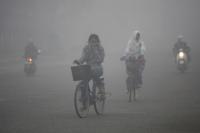-
Climate change means land use will need to change to keep up with global food demand
Researchers warn that without significant improvements in technology, global crop yields are likely to fall in the areas currently used for production of the world’s three major cereal crops — wheat, maize, and rice — forcing production to move to new areas. This could lead to a major drop in productivity of these areas by 2050, along with a corresponding increase in potential productivity of many previously unused areas, pointing to a major shift in the map of global food production.
-
-
Smoke from 2015 Indonesian fires may have caused more than 100,000 deaths

In the fall of 2015, hazardous levels of smoke from agricultural fires blanketed much of Equatorial Asia. Schools and businesses closed, planes were grounded, and tens of thousands sought medical treatment for respiratory illness. In a new study, researchers estimate that the 2015 smoke event caused upward of 100,000 deaths across Indonesia, Malaysia, and Singapore.
-
-
How Congress is failing on Zika
Three times Congress has taken up legislation to fund the continuing response to the Zika outbreak. Three times the bill, which would allocate $1.1 billion to fight the disease, has fallen short of attracting bipartisan support. While Congress delays action on Zika, the number of infected people keeps climbing. As of mid-September, there were over 3,000 reported cases in the fifty states and close to 18,000 when you count in U.S. territories like Puerto Rico and the Virgin Islands. One thing the Zika crisis has made clear is that solving emerging disease outbreaks increasingly involves navigating treacherous political waters. Congress’ lack of understanding of the real scope of voucher program – which aims to spur development of new drugs for neglected diseases — compromises efforts to find new ways of encouraging R&D in neglected diseases like Zika. Its inaction when it comes to extending funding for a major outbreak may endanger the health of thousands of Americans.
-
-
UN’s Sustainable Development Goals: Wicked trade-offs between environmental, food security goals
As world leaders gather in New York for the UN General Assembly, one year after the formal adoption of the UN’s Sustainable Development Goals (SDGs), a new study finds that policies focused solely on the environment tend to increase food prices. However, the study goes on to identify sustainable consumption and production practices as key to achieving both environmental and food security targets simultaneously.
-
-
Neglected Tropical Diseases: Some progress toward addressing the chronic pandemic
Neglected Tropical Diseases (NTDs) have been included in United Nations Sustainable Development Goals, and are now recognized as true markers of poverty. But there is still no recognition of the true level of mortality associated with this particular group of diseases. Around 12,000 people died as a result of the recent Ebola outbreak in Guinea, Sierra Leonne, and Liberia, but experts say that during the same period of time at least ten times that many people died as a result of NTDs.
-
-
Star-shaped polymers, not antibiotics, kill antibiotic-resistant bacteria
Currently, the only treatment for infections caused by bacteria is antibiotics. However, over time bacteria mutate to protect themselves against antibiotics, making treatment no longer effective. These mutated bacteria are known as “superbugs.” Tiny, star-shaped molecules are effective at killing bacteria that can no longer be killed by current antibiotics, new research shows. The research holds promise for a new treatment method against antibiotic-resistant bacteria, or superbugs.
-
-
Building a biosafety and biosecurity toolkit for a safer gene editing research
A new DARPA program could help unlock the potential of advanced gene editing technologies by developing a set of tools to address potential risks of this rapidly advancing field. The Safe Genes program envisions addressing key safety gaps by using those tools to restrict or reverse the propagation of engineered genetic constructs. Safe Genes was inspired in part by recent advances in the field of “gene drives,” which can alter the genetic character of a population of organisms by ensuring that certain edited genetic traits are passed down to almost every individual in subsequent generations.
-
-
Growing concern about amateur “biohackers” creating biological weapons
American and European security agencies have been increasingly focusing on the risk that “biohackers” – scientists who use genome-editing techniques to change life forms by increasing or decreasing the function of genes — could develop biological weapons or other dangerous biological substances. The problem is not only – or even mostly – with the work of professional scientists. Rather, the real danger lies with amateur scientists around the world who have started to use gene-editing techniques after the tools became cheap and readily available.
-
-
Keeping pace with the fast-developing science of gene drives
The emerging science of gene drives is drawing attention for its potential to help with critical health issues such as mosquito-borne diseases and environmental concerns such as agricultural pests and invasive species. At its most basic, a gene drive operates outside the traditional realm of genetics, in which an offspring has a 50-50 chance of inheriting a trait from one of its parents. A gene drive introduces a trait that will spread — or drive — through a population. “The science of gene drives is moving very fast,” says an expert. “[O]ur ability to assess the risks of gene drives, to oversee them with regulatory agencies, and to have a public discussion around gene drives is falling behind the science — We don’t want to wait until we have the technology in front of us to have discussions about regulation, oversight, ethics, and engagement.”
-
-
FBI’s WMD Directorate marks its first decade
If you can imagine a disaster involving explosives or the release of nuclear, biological, chemical, or radioactive material, there is a pretty good chance a group of subject-matter experts within the FBI has built an elaborate scenario around it and tested how well emergency responders face up to it. It is the main jobs of the Weapons of Mass Destruction (WMD) Directorate — to imagine worst-case scenarios and then devise ways to prevent and prepare for them. The Directorate was created ten years ago, on 26 July 2006.
-
-
U.S. response to Zika: Fragmented and uneven

How is the United States responding to Zika? CDC is doing what it can to support efforts to halt disease transmission and support state and local government. But on 30 August CDC director Tom Frieden announced that the agency had almost run out of money to fight the virus. Congress has yet to pass a funding bill, leaving the Obama administration to redirect money earmarked for other purposes to support Zika research and response efforts. The response so far seems fragmented, and even somewhat contentious – not unlike the response to the Ebola crisis in the United States in 2014. The response to that public health crisis was shaped by the fragmented and partisan U.S. political system, not by epidemiology or medicine.
-
-
Vaccine against “flesh-eating” bacteria in sight
Biochemists have uncovered patterns in the outer protein coat of group A Streptococcus that could finally lead to a vaccine against this highly infectious bacteria — responsible for more than 500,000 deaths a year, including toxic shock syndrome and necrotizing fasciitis or “flesh-eating disease.”
-
-
Climate, air travel maps identify countries in Africa, Asia at greatest risk of Zika virus
Many countries across Africa and Asia-Pacific may be vulnerable to Zika virus outbreaks, with India, China, the Philippines, Indonesia, Nigeria, Vietnam, Pakistan, and Bangladesh expected to be at greatest risk of Zika virus transmission due to a combination of high travel volumes from Zika affected areas in the Americas, local presence of mosquitos capable of transmitting Zika virus, suitable climatic conditions, large populations, and limited health resources. The authors of a new study say that identifying where and when populations would be most susceptible to local transmission of Zika virus could help inform public health decisions about the use of finite resources.
-
-
Zika reference strain sequenced; will help in diagnosis, screening
An international team of researchers has sequenced a strain of the Zika virus that will be used as a World Health Organization (WHO) reference strain to identify Zika virus infection in the blood, thus making it easier to diagnose the disease.
-
-
Solar-powered Ring Garden combines desalination, agriculture for drought-stricken California
With roughly 80 percent of California’s already-scarce water supply going to agriculture, it is crucial for the state to embrace new technologies that shrink the amount of water required to grow food. Alexandru Predonu has designed an elegant solution which uses solar energy to power a rotating desalination plant and farm that not only produces clean drinking water for the city of Santa Monica, but also food crops — including algae.
-
More headlines
The long view
We Ran the C.D.C.: Kennedy Is Endangering Every American’s Health
Nine former leaders of the Centers for Disease Control and Prevention (CDC), who served as directors or acting directors under Republican and Democratic administrations, serving under presidents from Jimmy Carter to Donald Trrump, argue that HHS Secretary Roert F. Kennedy Jr. poses a clear and present danger to the health of Americans. He has placed anti-vaxxers and conspiracy theorists at top HHS positions, and he appears to be guided by a hostility to science and a belief in bizarre, unscientific approaches to public health.
